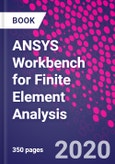ANSYS Workbench for Finite Element Analysis helps engineering academics and professionals learn to use this tool as efficiently as possible. In addition, it provides the background FEA and engineering analysis theory needed to develop quality models and correctly interpret results. Using a lecture lab style approach, the book gradually builds in complexity towards advanced techniques, with examples, exercises and reading lists supporting throughout. Readers will quickly become confident in using powerful ANSYS features for finite element based engineering problems.
This book provides a solid foundation on which to build, preparing readers to become power users who can take advantage of everything the program has to offer.
- Prepares readers to create industry standard models with ANSYS in five days or less
- Covers complex simulation features, including explicit dynamics
- References ANSYS documentation throughout, focusing on developing overall competence with the software before tackling any specific application
- Gives guidance on postprocessing and reviewing results to ensure models are accurately interpreted
Table of Contents
1. Introduction to Workbench and Finite Element Analysis2. The Workbench Project
3. Geometry, The Design Modeler Environment
4. Defining Engineering Data/Material Properties
5. The Mechanical Environment
6. Meshing
7. Workbench Analysis Environment
8. Solution Setup
9. Postprocessing and Reviewing Results
10. Using Workbench Files








